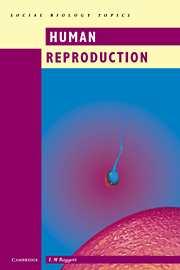Book contents
- Frontmatter
- Contents
- 1 Human reproductive strategies
- 2 Gamete production
- 3 Fertilisation
- 4 Implantation and pregnancy
- 5 Birth and lactation
- 6 Contraception
- 7 Human infertility: background and causes
- 8 Human subfertility: options and treatment
- 9 Ethical and moral considerations of fertility and infertility
- Index
5 - Birth and lactation
Published online by Cambridge University Press: 05 June 2012
- Frontmatter
- Contents
- 1 Human reproductive strategies
- 2 Gamete production
- 3 Fertilisation
- 4 Implantation and pregnancy
- 5 Birth and lactation
- 6 Contraception
- 7 Human infertility: background and causes
- 8 Human subfertility: options and treatment
- 9 Ethical and moral considerations of fertility and infertility
- Index
Summary
The perinatal period
Few areas of medical care have seen so many technological advances in recent years as that of the perinatal period (around the time of birth). This is particularly true of the techniques available to the late fetus and newborn baby. Childbirth is a natural function, but if it is left to run its natural course, it may not have a successful outcome for the mother or the baby. The obstetric team regard their job of helping a couple at the time of the birth of their baby as a privilege, and their aim is to make it as natural and happy an experience as possible. However, the safety of the mother and baby is of overriding importance, and if anything goes wrong during the birth they may have to intervene and manage the birth in a way which detracts from the parents' wishes.
Many couples favour natural childbirth, including home deliveries, with little or no medical intervention. However, there is no doubt that the delivery suite in a hospital is in a position to act very quickly if an emergency arises.
Stages of normal labour
Labour is an appropriately named body function – it is very hard work. The staff of the antenatal clinic prepare the prospective parents for the birth of their child by organising classes at which the process of labour is explained and their own plans for the delivery are discussed.
- Type
- Chapter
- Information
- Human Reproduction , pp. 55 - 62Publisher: Cambridge University PressPrint publication year: 1997



